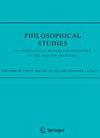休谟理性主义
IF 1.1
1区 哲学
0 PHILOSOPHY
引用次数: 0
摘要
根据充分理由原则,每个事实都有解释。这一原则面临的一个重要挑战是,它有可能成为自身的反例。是什么解释了为什么每件事都需要解释?我的第一个目标是区分对这个问题的两大类回答,我称之为 "休谟理性主义 "和 "非休谟理性主义"。我的第二个目标是为休谟理性主义的前景辩护。本文章由计算机程序翻译,如有差异,请以英文原文为准。
Humean Rationalism
According to the Principle of Sufficient Reason, every fact has an explanation. An important challenge to this principle is that it risks being a counterexample to itself. What explains why everything needs to be explained? My first goal is to distinguish two broad kinds of answers to this question, which I call “Humean Rationalism” and “Non-Humean Rationalism”. My second goal will be to defend the prospects of Humean Rationalism.
求助全文
通过发布文献求助,成功后即可免费获取论文全文。
去求助
来源期刊

PHILOSOPHICAL STUDIES
PHILOSOPHY-
CiteScore
2.60
自引率
7.70%
发文量
127
期刊介绍:
Philosophical Studies was founded in 1950 by Herbert Feigl and Wilfrid Sellars to provide a periodical dedicated to work in analytic philosophy. The journal remains devoted to the publication of papers in exclusively analytic philosophy. Papers applying formal techniques to philosophical problems are welcome. The principal aim is to publish articles that are models of clarity and precision in dealing with significant philosophical issues. It is intended that readers of the journal will be kept abreast of the central issues and problems of contemporary analytic philosophy.
Double-blind review procedure
The journal follows a double-blind reviewing procedure. Authors are therefore requested to place their name and affiliation on a separate page. Self-identifying citations and references in the article text should either be avoided or left blank when manuscripts are first submitted. Authors are responsible for reinserting self-identifying citations and references when manuscripts are prepared for final submission.
 求助内容:
求助内容: 应助结果提醒方式:
应助结果提醒方式:


